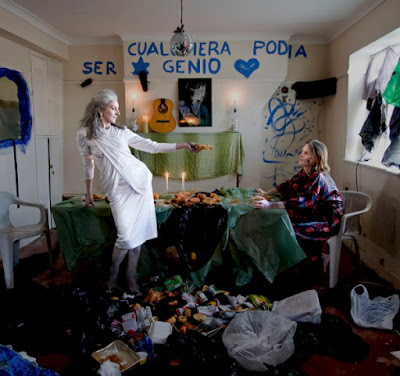I met an old friend today. After a career as an agent he is retraining as a psychologist. "I am back at college" he said. He is in his mid-forties now. "I really wanted to be a psychiatrist", he went on. "But between medical school, foundation training and six years specialisation I will be nearing retirement age by the time I finish". Yep. It takes that long. "As a psychologist I can specialise in clinical psychology" he added. "Don't you need a PhD for that?" "Yeah, I am thinking about it". Well, welcome to several years of abject poverty, my friend. PhD training is very expensive and very demanding too. I did one in the Arts many years ago. Another life.
We had a lovely afternoon. I am retraining as a somatic psychotherapist, he is retraining as a psychologist, with ambitions to become a clinical psychologist. We sure had much to talk about. We had tea and he showed me an article about the effects of serotonin on moral judgement. According to recent cognitive neuroscience research, said the writer of this article, serotonin has an effect on altering emotions and thus moral judgement, suggesting that "individuals with altered levels of serotonin in the brain, such as depressed individuals, may also have different morals as a result of this imbalance". I was not impressed, this is the chemical model of mental illness at its worst. It was at this point that my friend introduced me to the work of Niall McLaren.
"Nowadays, we have domestic science, political science, sports science, social science, military science, retail science, management science and so on. The Nazis even had a racial science. What is this strange thing called science that everybody wants a bit of the action? What is its attraction, what is its power over people? When we look at all the dreadful things that have been done in the name of science, you really would wonder why anybody would bother, but still they come"
Niall McLaren
Dr McLaren, Australian, is the author of the book Humanizing Madness: Psychiatry and the Cognitive Neurosciences (2007) which counters the tenet of modern psychiatry that mental illness is due to a chemical imbalance. "Because of my work in developing isolated psychiatric services, I have not been eligible for the normal academic posts, as these are not available in isolated areas" says Niall McLaren. This is quite telling.
It is important to be aware of Niall McLaren's critique. It is a breath of fresh air. I have been volunteering for a mental health day centre where I have met people whose personality has been completely modified by the heavy medication they are prescribed. Far too often people have complete faith in the power of medication without realising that many of the drugs they are being given are unnecessary or down right wrong.
"Because psychiatrists are trained in a particular and highly successful ontology, and because medical training does not encourage criticism, there is no reason to believe that orthodox psychiatry will encourage a process of self-criticism sufficient to examine its most fundamental premises. At the same time, students of the sociology and epistemology of science, who claim to have the unique intellectual tools that conventional scientists lack, appear to have contributed very little, if anything, to the question of what is the correct model of mental disorder. This should be cause for the very greatest concern but, if nothing happens, it will be cause for despair."
Niall McLaren
Where do we go from here? The first step is to challenge Big Pharma and its links with biochemical psychiatry. We need a more humane and less drug oriented psychiatry. We are perturbed when we see a heroin addict injecting and yet we say nothing when we see chronic mental illness sufferers totally stupefied and confused by heavy medication doses.
"There is much evidence that there is less psychotherapy provided by psychiatrists than 10 years ago. This is true despite the strong evidence base that many psychotherapies are effective used alone or in combination with medications" wrote Steven Sharfstein in 2005.
I shudder to think what will happen to the mental health sector with all the NHS cuts we are undergoing in the UK. It is a real cause for concern. And for me the big question is: when I finish my training as a somatic psychotherapist will I only be able to offer my services to paying clients in the private sector?
(All photos by Joanna Nowek and modelled by Alex B and Adrian "LondonNude")




I have theorized for a while now that, rather than causing psychoses etc., chemical imbalances *are caused by* psychoses. In other words, that conventional psychiatry has it backwards. Sounds like Dr. McLaren would agree with me.
ReplyDeleteAs for "science," there's a distressing modern tendency to treat it like a god. It isn't. It's only a method to learn, and scientists are also humans with human viewpoints and prejudices. You might as well say "Apprenticeship will transform the trades," or, "Homiletics will create a Holy Spirit revival." (Homiletics is the study of preaching.)